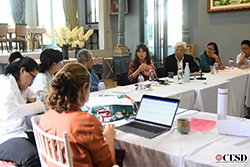Assessing ‘Successful’ Community Based Research: How has Knowledge been Co-Produced?
Events
Venue : Faculty of Social Sciences, Chiang Mai University
The Seminar to be held on June 15-16 2023 explores existing and emerging innovative framework on Coproduction, building upon 20 years of Community-Based Research (CBR) in Thailand. This seminar is the culmination of an assessment of successful CBR projects, conducted between 2019-2022, and will explore five case studies to better understand implementation, applied methodologies and multi-stakeholder criteria for what determines ‘success’.
Additional case studies from other contexts (Indonesia, Lao, Timor-Leste) will be discussed from a comparative perspective.
Background
In the 1998, Thailand Research Funds (TRF) adopted an innovative policy which aimed to support rural villagers to conduct research - known as Community-Based Research (CBR). TRF believed that the villagers knew their problems well and could collectively find solutions. The policy aimed to shift the ownership of research from the academic community to the rural communities who were experiencing the challenges that were being studied, with the aim of addressing the extractive nature of academic research, whose high-quality findings have not always been accessible to local people. TRF saw CBR as a practical tool for villagers to solve village-level problems by themselves and provided significant resources to enable and support CBR throughout Thailand. TRF also set up mechanisms to facilitate villager/researcher engagement in addition to mentoring and monitoring assistance through the process.
Over just under 20 years of CBR, project success and outputs varied. Several projects which were successful, in that CBR strengthened community ability to identify and solve their own problems, such as gambling, alcohol consumption, redeeming debts, etc. However, not all CBR projects could fulfill their objectives. Questions were raised about the rigor of research methods used, in that many villagers could not successfully deliver their research findings in adequate ways. Most research reports were descriptive ; they looked like development project reports rather than research reports. It was understood that villagers do not have the necessary writing skills for delivering research outputs. In response, CBR/TRF implemented a policy that involved academics collaborating with villagers to implement research projects. It was expected that this collaboration could lead to a rigorous research project. However, at this time the term “co-production of knowledge” was not used by CBR/TRF.
Methodologies and implementation for success : an assessment
In 2019, the Thailand Research Fund approached the Centre for Ethnic Studies and Development, Faculty of Social Sciences (Chiang Mai University), led by Dr. Chayan Vaddhanaphuti, to assess CBR projects. The assessment aimed to identify successful CBR projects and to understand how they were implemented, identifying successful cases and the methodology used. Familiar with Thai Baan Research, each member of the assessment team was assigned to carry out an overall assessment of CBR undertaken in the four regions of Thailand.
The seminar on June 15-16 is a culmination of the findings of this assessment, and five papers will be presented :
- Co-production of Knowledge on Indigenous Rice Seeds Selection and Development among Northeastern Farmers in Kam Maed Sub-district, Kud Chum District, Yasothon Province, Thailand.
- Indigenous knowledge on Riverine Ecological System : A Co-production of Knowledge on People’s Livelihoods to be affected by A Flood-Control Dam in Northeast Thailand.
- Conflicts between Wild Elephants and People : A Citizen Science Perspective or Co-production of Knowledge
- Local History of Communities around Songkla Lake, Southern Thailand
- Network of Learning among Organic Farmers in Lamphun : Co-Production of Knowledge
Two other papers will be presented to discuss, from a comparative perspective, cases of participation in the Indonesian (Gabriel FACAL, IRASEC) and Lao (Phong An Huynh, NGO GRET) contexts, in terms of Commons in the Lao context.
Objectives of the Seminar :
- To share and exchange about the community based research particularly co-production of knowledge methodology, in relation with an approach in terms of “commons”.
- To develop community based research in the context of Greater Mekong Region, with a comparison with other contexts (Indonesia).
- To expand the academic network on community based research.
19 June 2023











